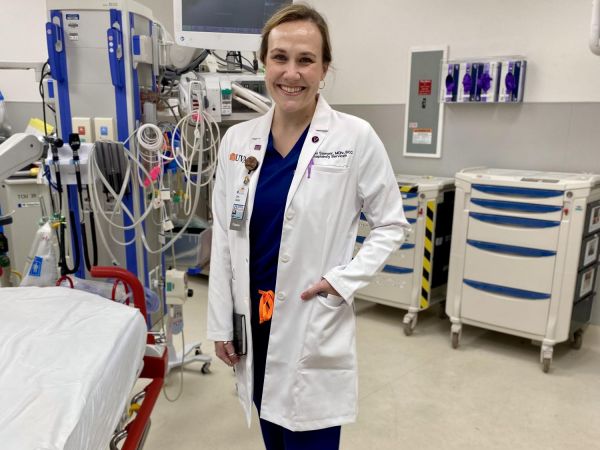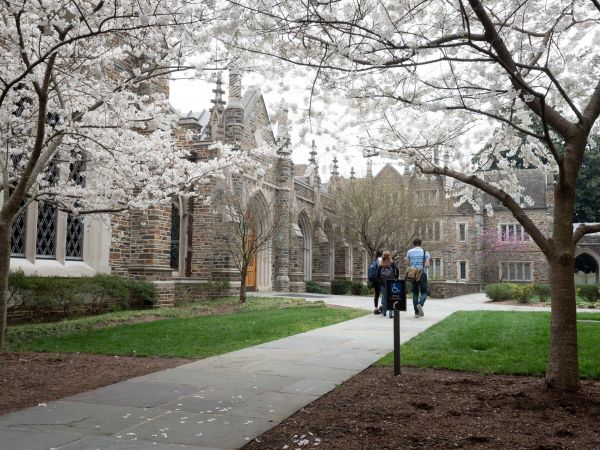The joint M.Div./M.P.P. program provides a unique and exciting opportunity to understand, critically examine, and work faithfully at the interface of the world of public policy and public administration and the world of churches and faith-based organizations. It equips students to navigate points of tension and overlap between these two spheres so that they can help generate a more resilient, just and generous common life in which all may flourish.
The M.Div./M.P.P. degree is designed to prepare individuals for positions of leadership, service, and advocacy in nonprofit organizations, government, and in the wider community. The program equips graduates to serve as influencers of positive change on pressing issues around the globe.
The M.Div./M.P.P. program can be completed in four continuous years of full-time study (instead of five years) and leads to a Master of Divinity degree and a Master of Public Policy degree at Duke’s Sanford School of Public Policy.
Our M.Div. students come from across the country and around the world to pursue a variety of career paths. Some come to be ministers, church planters, and other leaders of the 21st century church. Others come to deepen their connection to Christian ministry in their nonprofit work, chaplaincy, teaching and writing, or any form their ministry takes. What they share is a desire for a program that is academically rigorous and unabashedly Christian. 57% of M.Div. graduates choose church-based ministry, while 43% choose positions in nonprofit organizations, chaplaincy, education, or further graduate work.
The M.Div. program at Duke boasts an academically rigorous curriculum surrounded by vibrant worship, contextual learning, opportunities for spiritual formation, and a close-knit student community. The M.P.P program at Duke’s Sanford School of Public Policy offers students outstanding preparation for dynamic careers as analysts, leaders, and managers at various levels of government, nonprofits, and corporations—both domestically and internationally.
Top Tier Faculty
Our faculty are at the pinnacle of their fields of study, and their work is at the cutting edge of research. Students benefit by studying directly with academics who are not only the best at what they do but dedicated to the church and to nurturing the next generation of pastors, thinkers, and doers of theology.
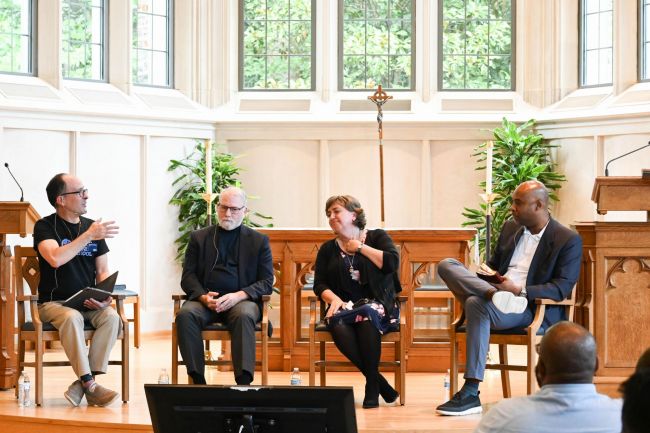

Practical Experiences
Duke Divinity is unique in its ability to provide funding for up to three field education internships (two placements are required for graduation). Placements can be in nonprofit settings, prisons, and innovative communities of learning, where our students are partnering between local churches and community service organizations to strengthen rural areas in North Carolina. International opportunities are also available. $10,000 in funding is available for each placement.
Interdisciplinary Opportunities
Within Divinity courses, students have opportunities for in-depth exploration of critical theological issues that face contemporary society. For instance, you can take a class with Project TURN, in which incarcerated men and women study alongside Duke Divinity School students; engage connections between food and faith with Professor Norman Wirzba; discover the intersections of theology and the arts with DITA; explore connections between Christianity and medicine with practicing physicians and theologians. Students can take two classes outside of Divinity School course offerings, taking advantage of our position at the center of a top tier research institution with 10 graduate and professional schools.
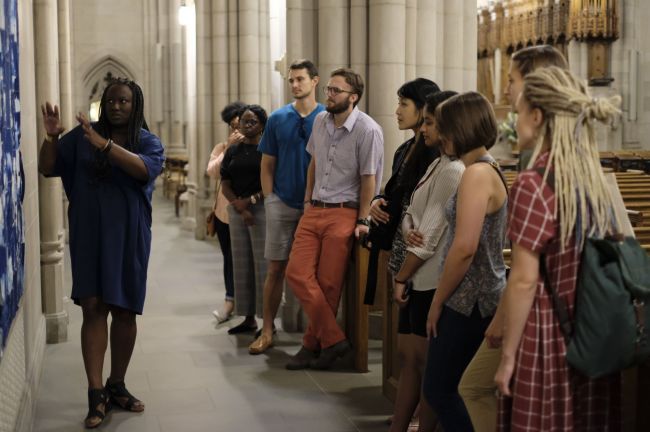
Houses of Study
Our houses of study help prepare you for service—and ordination—in the communities and denominations where you’ll serve. They include the Methodist/Wesleyan House of Studies, the Baptist House of Studies, the Anglican Episcopal House of Studies, the Presbyterian/Reformed House of Studies, the Office of Black Church Studies, and the Hispanic House of Studies.
Curriculum
The curriculum for our flagship degree program is designed to give students a solid foundation for wherever their calling takes them—be that ordination, lay ministry, nonprofit work, or a career in teaching. Our classes cover Old and New Testament, church history, Christian theology, world Christianity, ministry, worship, preaching, biblical languages, the Black Church, and a variety of electives.
The M.P.P program at Duke’s Sanford School of Public Policy offers students outstanding preparation for dynamic careers as analysts, leaders, and managers at various levels of government, nonprofits, and corporations—both domestically and internationally.
Those interested in dual-degree programs are required to pursue admission to each school independently, and upon successful admission to both programs, are enrolled as dual-degree students.
The core curriculum of each degree must be completed at each institution. Students spend the first two years at Duke Divinity School and the third year at the Sanford School of Public Policy. The final year is a blended year at both schools.
Spiritual Formation
We form students for ministry in a variety of ways—through coursework, corporate worship, field education, service opportunities, houses of study, and denominational associations. Each first-year M.Div. student will have multiple options for intentional formation that will complement your academic work and field education opportunities. Students receive support and mentoring for vocational discernment and spiritual direction.
Graduation Requirements
M.Div.
- Twenty Divinity School courses/sixty credit hours (this number is reduced as part of the dual degree status)
- Student portfolios (middler review and senior portfolio)
- Two approved units of field education
M.P.P.
- 39 credit hours (split between foundation and concentration credits)
- Summer internship
- Master’s Project
- Two public policy electives
Center for Writing and Academic Support
The Center for Writing and Academic Support provides services for writers of all abilities. In addition, we offer the RISE pre-orientation workshop to introduce the fundamentals of theological thought and writing; ongoing academic support workshops throughout the year; and tutors who are available to work with students one-on-one.

Certificates



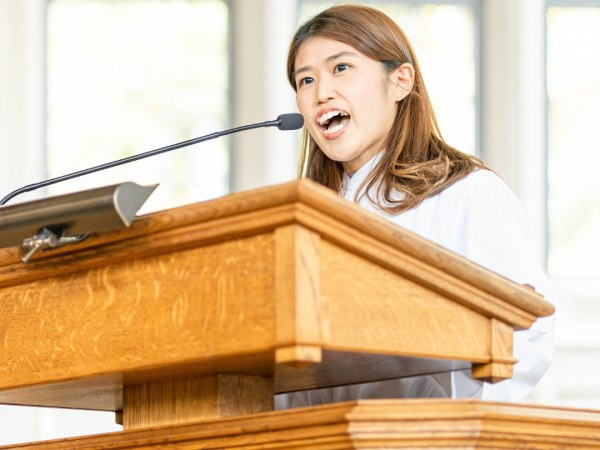

An education from Duke Divinity School is worth your investment, and you do not have to figure out the finances alone.
All M.Div. students receive funding.
Duke Divinity School is investing in you, too. It is an investment in your education, the church, and our shared future. All M.Div. students receive some form of scholarship support from Duke Divinity School that will cover between 25% and 100% of tuition costs, and there is no separate application needed in order to be considered. The M.Div. program offers many fellowships that also provide tuition support. Many other internal and external scholarships, as well as federal financial aid in the form of work study and loans, make it possible for students to afford Duke Divinity. We are committed to ensuring that every student who hears the call to ministry can fund their education here. FAFSA should be completed for external aid. More information can be found in our Financial Aid section.
Paid Internships
Duke Divinity is unique in its ability to provide funding for up to three field education internships (two placements are required for graduation). The Office of Field Education pairs students with dynamic ministry contexts that can provide up to $10,000 per placement. This funding is in addition to any scholarships, grants, or outside aid that a student receives, and can result in as much as $40,000 in additional support throughout the course of the M.Div. program.
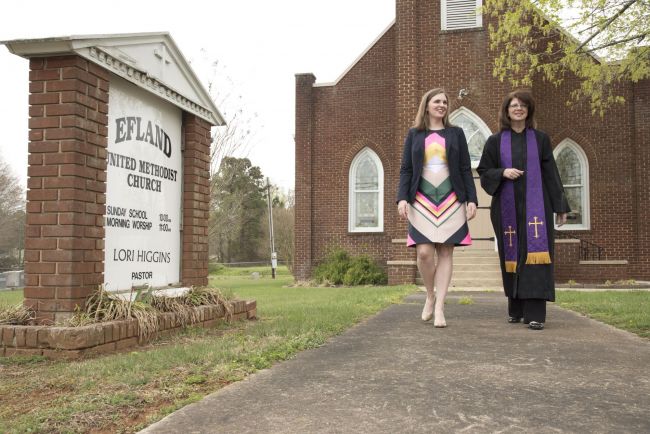

Lifelong Dividends
In addition to earning a degree from Duke Divinity School, you also receive benefits that continue to impact your life long after you leave. You’ll have space for learning timeless ministry skills, cultivating holy friendships that will sustain you, and building connections to faculty who can serve as mentors as your vocation unfolds. The overwhelming majority of our students say their investment is worth it.
Ready for the Next Step?
Duke Divinity School accepts applications from students with a demonstrated commitment to some form of ordained or lay ministry and a minimum GPA of 2.75 in a bachelor’s degree from a regionally accredited college or university prior to the intended date of enrollment.
M.Div. Application Requirements
Apply to the M.P.P.
The application deadline for the Master of Public Policy is January 5 at 5 p.m. EST. This deadline includes receipt of the $80 application fee and all application materials.
Request Info
Join our mailing list, and we'll send you more information.
Request Info about our programsVisit Campus
The best way to learn more about us is to visit. Schedule an in-person or online visit.
Visit Us


